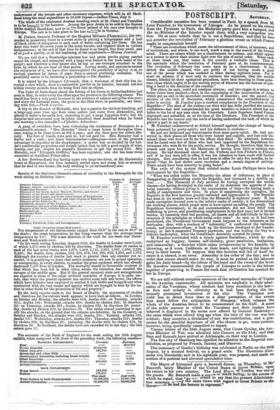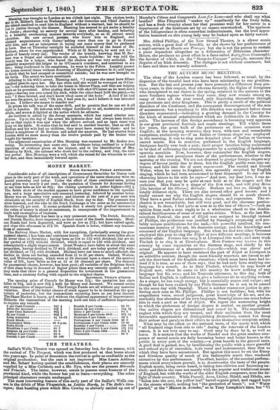The Mayor of Liverpool gave a farewell dinner, on Thursday,
to Mr* Bancroft, lately Minister of the United States to Gr.-4 Britain, upon his return to his own country. The Lord Mee., of—London was one of the guests. Mr. Bancroft made a snee"4 ur much feeling; in the coat" of tue same views with regard to Great Britain as the which he stated, that " sound to say that the present Administra- tion entertain
ne had the honour to represent."
Manning was brought to London at ten o'clock last night. The cholera broke eat in St. Hillier's Gaol on Wednesday; and the Governor and Chief Justice of the island resolved to send him to England without a warrant, lest he should be lest to justice through the disease. Manning has seemed to act under a fatality in Jersey ; observing no secrecy for several days after landing, and behaving is a boastful overbearing manner towards everybody, so as to attract much attention. He saw several persons who knew him in England, and claimed acquaintance with them;- asking more than one to go to France with him, and act as interpreter in laying out some money that he professed to have. But on Thursday sennight he secluded himself at the house of Mr. Berteau, where he was apprehended. While at M. Berteau's, he sent out for a bottle of brandy every day. The vendor of the brandy, knowing that M. Ber- teen was a frugal and abstemious old man, made inquiries: he was told the brandy was for a lodger, who feared the cholera and was very secluded. He instantly suspected the lodger to be O'Connor's murderer, and contrived to see him; being confirmed in his suspicions, he went to the Police. Langley passed the house several times without dreaming of Manning's presence in it; and began to think that he had escaped or committed suicide; but he was now brought on his heels. The arrest we have mentioned. Alluding to his wife's arrest, Manning said, "I suppose she must have fifteen hundred pounds upon her. She has often said she would be revenged on 0 Con- nor,"—for inducing them to take the house in Minver Place, and then not lodging there as he promised. After stating that his wife shot O'Connor as he went down stairs,—having one arm round his neck, while the other hand held the pistol,—he said, "I then fainted, and don't know what came of the body." Asked if he had not seen the grave, he said, " Oh yes, I bad seen it; and I believe it was intended for me. I believe she meant to murder me."
In prison his talk was of the same drift, and he persists that be can set it all right in London. He behaves with vulgar familiarity to all, maintains a jocular etrain, and seems delighted at the notice which he attracts.
An incident is added by the Jersey accounts, which has raised ulterior sus- picions. Up to the day of his arrest his bedroom-door had always been locked; but on that night it was ajar when the officers arrived, and an open razor was lying on his table. It seems that he had said to another boarder, that as old bl. Bateau and his wife had no children, they must have money by them: and he visited a neighbour of M. Berteau and asked the question. He had started from London with no more money than the twelve pounds paid by the broker who bought his furniture. The adjourned examination of Mrs. Manning was resumed by Mr. Seeker yes- terday. No interesting fact came out; the evidence being confined to a formal repetition of evidence given at the inquest, and to the identification of Mrs. Manning by Kirk, the cabman who drove her to the railway, and Day, the rail- way porter. Mrs. Manning wore a veil, which she raised for the witnesses to view her face, and then immediately lowered again.



























 Previous page
Previous page